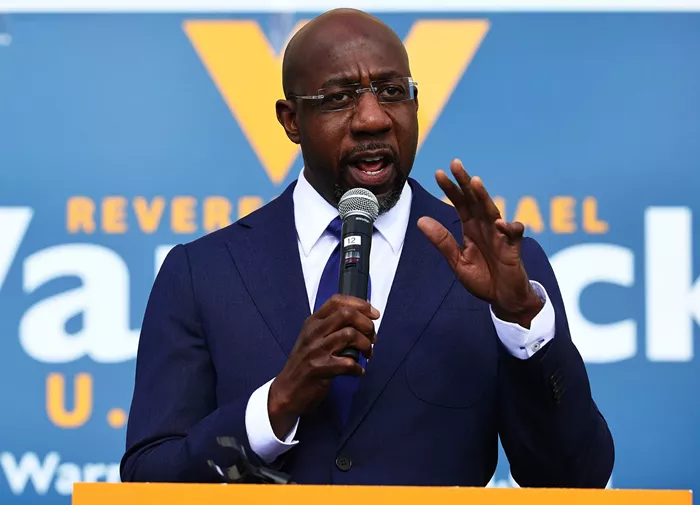Georgia Senator and prominent Baptist pastor Raphael Warnock recently took aim at former President Donald Trump, delivering a pointed rebuke rooted in scripture. Speaking at the Democratic National Convention, Warnock criticized Trump for what he saw as a superficial use of the Bible, suggesting that the former president’s actions and policies stand in stark contrast to the teachings of the very book he promoted.
Warnock’s comments were sparked by a recent fundraising initiative from Trump’s camp, which involved selling $60 “God Bless the USA” Bibles. These Bibles, named after the patriotic song by country singer Lee Greenwood, were marketed to Trump’s supporters as a way to combine faith with patriotism. For Warnock, however, this move was emblematic of a deeper problem: the exploitation of religious symbols for political gain.
“Yes, I saw him,” Warnock told a captivated audience. “I saw him holding the Bible and endorsing a Bible as if it needed his endorsement.” His remark drew attention to a widely-publicized moment during Trump’s presidency when he held up a Bible in front of St. John’s Episcopal Church in Washington, D.C., a gesture that was met with both support and criticism. For many, including Warnock, the act symbolized the appropriation of religious imagery for political ends rather than a genuine expression of faith.
Warnock didn’t stop at critiquing Trump’s symbolic gestures. He called into question the former president’s understanding and application of the Bible’s teachings. “He should try reading it!” Warnock exclaimed, his voice rising with passion. “It says do justice, love kindness, and walk humbly with your God. He should try reading it. It says love your neighbor as yourself. It says in as much as you’ve done to the least of these, you have done also unto me.”
These verses, from the books of Micah and Matthew, respectively, are cornerstones of Christian ethics, emphasizing the importance of justice, mercy, humility, and compassion. Warnock’s use of these scriptures was a deliberate contrast to what he perceives as Trump’s divisive and self-serving rhetoric.
The senator further elaborated on his vision of America, one that is inclusive and just, rooted in the principles of equality and unity. “I choose the American covenant, ‘E Pluribus Unum’—out of many, one,” Warnock declared, referring to the nation’s motto. He linked this ideal to his own election on January 5, 2021, a historic moment when Georgia elected its first Black senator. Warnock sees his victory as a testament to the power of ordinary people coming together to demand a better future, one that offers opportunities to all, regardless of background.
Warnock’s critique of Trump is not just a political maneuver; it is a reflection of his deeply held beliefs as both a pastor and a public servant. His message resonates with many who feel that religious faith should be more than just a political tool; it should be a guiding force for justice, kindness, and humility. By invoking scripture, Warnock is reminding both Trump and the American public that the values espoused in the Bible call for a commitment to the common good, something he believes is often missing in contemporary political discourse.
As the nation continues to grapple with deep divisions, Warnock’s words serve as a call to return to the core principles of faith that transcend party lines. His critique of Trump is not just about one man but about the broader challenge of ensuring that religious values are reflected in the actions and policies of those in power. In a time of political and social upheaval, Warnock’s biblical putdown is a powerful reminder of the moral responsibilities that come with leadership.

